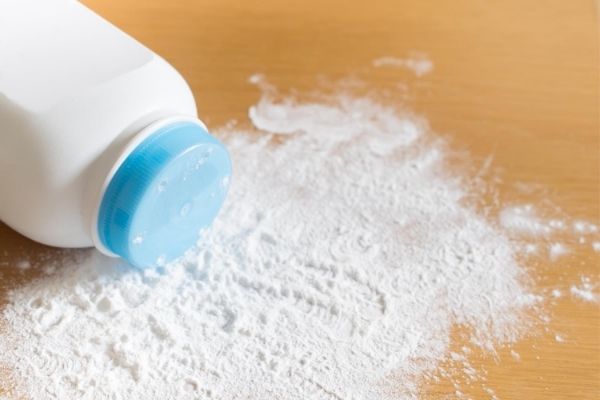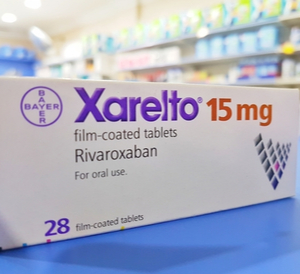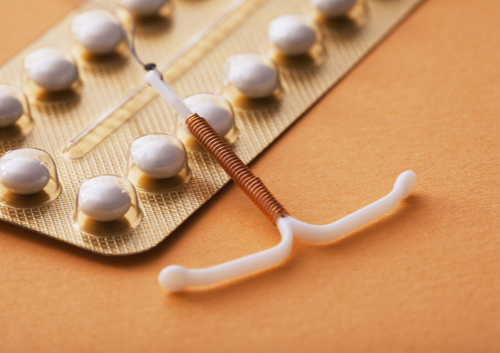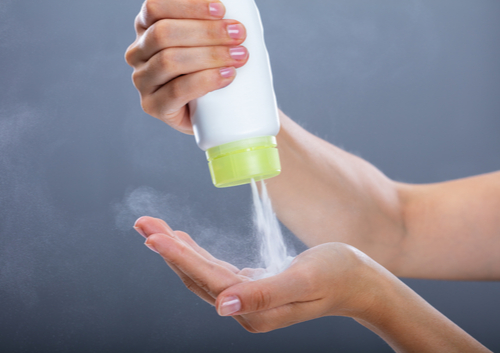After decades of litigation and thousands of consumer complaints, the Johnson and Johnson baby powder lawsuit has finally reached a tipping point. The product is now out of production and the company will pay $2.1 billion to individuals who claim the talc-based product caused their ovarian cancer. Read on for details regarding the ongoing case and find out how Huber Thomas & Marcelle can assist in similar cases.
J&J loses $417 million in California’s first talc verdict case
 In the 2017 case of Echeverria v. Johnson & Johnson, the company was ordered by a Los Angeles jury to pay $417 million to 62-year-old Eva Echeverria.
In the 2017 case of Echeverria v. Johnson & Johnson, the company was ordered by a Los Angeles jury to pay $417 million to 62-year-old Eva Echeverria.
Echeverria started using Johnson and Johnson’s talc powder products when she was 11 and was diagnosed with ovarian cancer in 2007. According to Echeverria’s attorneys, the lawsuit stemmed from the company's alleged ignoring of studies that linked the baby powder and Shower to Shower talc products to ovarian cancer. Further, they maintain that the company failed to warn customers about the risk.
Today, Johnson and Johnson continues to claim that these allegations do not hold weight when it comes to sufficient scientific evidence. A New Jersey state court tossed out two similar cases set for trial after the judge said that evidence linking talc to ovarian cancer was inadequate. This was a temporary boost in the messaging Johnson and Johnson had attempted to push in fighting related lawsuits.
However, in the end, the $417 million verdict in Los Angeles included $347 million in punitive damages and $70 million in compensatory damages. What’s more, it marked the beginning of clients getting justice in their own Johnson and Johnson lawsuit matters. The trial in Los Angeles was the first before a state jury outside of Missouri. That’s where the company lost four out of five trials over two years, resulting in verdicts as high as $110 million.
Unfortunately, Echeverria passed away shortly after the trial came to an end.
Updates on the Johnson and Johnson baby powder lawsuit
While there was sufficient evidence to uphold the jury’s finding in Echeverria v. Johnson & Johnson, an appeals court granted the company a new trial in 2019. The Los Angeles-based court cited conflicting evidence about the baby powder’s cancer links.
According to California Superior Court Judge Maren Nelson, Johnson and Johnson could not be held liable for failure to warn, only the subsidiary that manufactured the product would have the duty of disclosing any and all risks. The appeals court also made claims that the evidence failed to support a finding of malice, which is a legal requirement for cases involving punitive damages.
Regardless of her death, Echeverria’s attorney has vowed to follow through and continue the fight, and he’s not alone. In June 2020, a Missouri appeals court ordered Johnson and Johnson to pay $2.1 billion to more than two dozen women.
Much like Echeverria’s case, Johnson and Johnson appealed the verdict, requesting the court throw out the decision. Fortunately, the court declined, citing “significant reprehensibility” in the company’s conduct.
Evidence from as far back as the 1960s demonstrated that the company’s talcum products contained asbestos, a known carcinogen. The ruling stated:
“A reasonable inference from all this evidence is that, motivated by profits, defendants disregarded the safety of consumers despite their knowledge the talc in their products caused ovarian cancer.”
The plaintiffs “showed clear and convincing evidence defendants engaged in conduct that was outrageous because of evil motive or reckless indifference,” the court said.
The attorney representing the women noted that several of them passed away before the ruling, as well as immediately after. This has only furthered the mission of attorneys across the U.S. to seek justice for their clients. For those who have suffered from cancer as a result of using these products, each Johnson and Johnson baby powder lawsuit is a critical step in the right direction
Lawsuits lead to a big win for consumers
While different lawsuits for damages are still underway in various states, there has been another recent victory for consumers. In May 2020, Johnson and Johnson announced the discontinuation of talc-based baby powder in the U.S. and Canada.
The company still maintains the position that these lawsuits are the result of confusion and misinformation. However, winding down the commercialization of the baby powder has begun. Existing inventory on the shelves will only remain until it runs out, but production in the U.S. and Canada has stopped.
For consumers, this is exciting news. It demonstrates the important role plaintiffs play in holding companies accountable. This type of victory ensures the safety of adults and children alike as it removes a harmful product from the shelves. There is the hope that production will end worldwide, thus removing these products from shelves globally.
Were you affected?
 At Huber Thomas & Marcelle, we have years of experience dealing with matters of product liability and harmful products. We pride ourselves on being tireless advocates for our clients when they deserve support. It’s always our goal to help you reach an outcome that will help you move forward with your life.
At Huber Thomas & Marcelle, we have years of experience dealing with matters of product liability and harmful products. We pride ourselves on being tireless advocates for our clients when they deserve support. It’s always our goal to help you reach an outcome that will help you move forward with your life.
While we were not directly involved in the original Johnson and Johnson baby powder lawsuit, we can assist in a search for class-action lawsuits that may be available to you. Even as related cases come to a close, there are still more victories to be had.
If you have cancer and believe it may be tied to the use of the products discussed here, you may have grounds for filing a Johnson and Johnson lawsuit. Contact us today to learn more.
Our approach to product liability cases in healthcare
The Johnson and Johnson talc lawsuit is particularly noteworthy, but there are many other healthcare and personal care companies facing similar claims of unsafe products.
At Huber Thomas & Marcelle, we fight for victims who have been harmed by defective medical devices, dangerous drugs, and other unsafe products. We're prepared to take on large companies by working with a team of world-class experts. Our goal is to ensure you receive the compensation you deserve and that those who have done harm are held accountable.
We represent clients in the following types of cases.
Unsafe product claims
Unsafe product claims can involve automobiles, watercraft, children’s toys, child safety seats, industrial machinery, recreational products, tires, safety or sporting equipment, and more. When manufacturing defects, design flaws, and lack of proper warning labels and information lead to injury or harm, compensation may be in order.
For example, Huber Thomas & Marcelle represented hundreds of military service members against 3M for providing allegedly defective earplugs. These claims arise from the fact that the 3M earplugs, distributed as the sole earplug to U.S. military service members between 2003 and 2015, were too short for proper insertion into the ears, putting users at risk for permanent hearing loss, hearing impairment, and tinnitus.
In July 2018, the Department of Justice announced that 3M had agreed to pay $9.1 million to resolve allegations that it knowingly sold the earplugs without disclosing defects that hampered their effectiveness.
If you are a service member who was diagnosed with hearing loss and/or tinnitus after serving in the U.S. military between 2003 and 2015, we encourage you to contact an experienced personal injury lawyer at Huber Thomas & Marcelle today. Learn more about this case here.
Pharmaceutical liability
If a drug is irresponsibly marketed, insufficiently tested, or incorrectly prescribed, the outcome can be devastating. The repercussions of dangerous drugs and practices can include birth defects, illness, and even death.
Admittedly, all medications come with a risk of side effects. But one Yale-led study found that “Nearly one out of every three drugs approved by the Food and Drug Administration (FDA) has a new safety issue detected in the years after approval.”
Patients expect prescription medication companies to thoroughly test drugs before they go on the market (and clearly explain their risks). When this doesn't happen, patients may be entitled to compensation from drug companies. This can help cover long-term costs related to:
- Ongoing medical care
- Specialized medical equipment
- Surgeries
- Lost wages and productivity
- Emotional and mental health challenges
At Huber Thomas & Marcelle, we take these cases seriously because they represent a breach of the trust we hold for our medical professionals. We have advanced experience working with prescription drug injury cases and can advise you on your legal rights.
Defective medical devices
While mistakes happen, manufacturers are obligated to test medical devices extensively before they become a source of serious injury to patients.
Product defects are often the result of rushing a product to market without careful product design and testing. In some cases, individual components are the source of the deficiency. Any device can cause harm, but certain types lead to more adverse events than others.
The Expert Institute found 20 products that lead to the most adverse events. These include:
- Insulin pumps
- Blood glucose tests
- Pacemaker electrodes
- Coronary stents
- Surgical mesh
- Knee prostheses
- Hip prostheses
If you've been harmed by a company's failure to properly test a product, you could be entitled to compensation. Our team of defective medical device lawyers is committed to helping you understand the complexities of bringing a case like this to court.
We’re here to help
When faced with pursuing litigation, you need a team you can trust.
At Huber Thomas & Marcelle, we pride ourselves on being tireless advocates for our clients. We make it our mission to clearly explain everything you need to know. We're always available if you have questions. In fact, we return most calls within 24 hours. With our firm on your side, you can expect help from a team of attorneys with a proven record of success. And, in many cases, you don't pay anything unless we win your case.
You can find more information about our practice areas here, or read answers to some of our most frequently asked questions here. In addition to Louisiana, members of our team are licensed to practice in Mississippi, Texas, Washington D.C., and New York. If you’d like to discuss the details of your case, please contact us for a free consultation.
Originally posted on August 22, 2017.
Rideshare companies are becoming a way of life, especially for those who live in big cities. According to a Pew Research Center survey, 36% of adults say they have used a ride-hailing service such as Uber or Lyft. For people who travel often, it’s an easy and convenient option. Gone are the days of renting a car or hailing a taxi. Unfortunately, with every advancement in technology, there are always issues that arise. While any car accident can be traumatic, those involving rideshare companies are particularly complicated. Uber lawsuits and Lyft lawsuits are difficult to navigate because you’re dealing with the driver, as well as the ride-share company and multiple insurance companies with individual interests.
At Huber Thomas & Marcelle, we have the necessary experience to help you navigate the complexities of rideshare accidents and issues. We can walk with you through the process, fighting for you every step of the way. The following profiles of Uber lawsuits show just how complex and varied these cases can be.
$20 million settlement reached for Uber TCPA violation
In August of 2015, a woman named Maria Vergara filed a proposed class action lawsuit against Uber. The suit claimed that Uber sent her continuous, unwanted texts over the course of several weeks. According to Vergara, they were urging her to complete the app’s sign-up process. Other named parties included Jonathan Grindell, Jennifer Reilly, James Lathrop, Sandeep Pal, and Justin Bartolet.
So why was this an issue? The Telephone Consumer Protection Act, also known as “TCPA,” forbids companies from sending automated text messages to individuals without consent. In 2018, Uber settled the lawsuit for $20 million. If an individual received one or more text messages from Uber between December 31, 2010 and August 17, 2017, they were potentially eligible for a payment from this class-action Uber lawsuit.
The $20 million settlement had three separate settlement classes:
- Class A: Everyone Uber texted about its Refer-a-Friend program
- Class B: Potential drivers who partially completed the company’s application and continued to receive unwanted texts from Uber, even after they asked the company to stop
- Class C: Everyone who did not provide their information to Uber, but received unwanted texts
As of August 2018, all checks were sent to eligible Settlement Class Members who filed a valid claim. However, in addition to paying $20 million in settlement money, Uber also agreed to make several changes.
First, the company discontinued its Refer-a-Friend automated text messages. They also made changes to the opt-out system to automatically unsubscribe recipients who reply with certain opt-out words. Furthermore, Uber improved their sign-up technology to reduce the likelihood of texting or calling wrong phone numbers in the future.
Updates to the case
Even with changes put into place, Uber continues to face ongoing allegations of TCPA violations. One of these suits came up just months after the $20 million settlement. In April 2018, a lawsuit filed in Florida challenged Uber’s alleged practice of sending template text messages to former drivers. According to the plaintiff, these text messages urge former drivers to come back to Uber and continue working.
Further, in late 2019, the District Court for the Southern District of California ordered another Uber TCPA case to arbitration. The plaintiff was a user of Uber’s ride-sharing service. However, the plaintiff began receiving unwanted calls regarding Uber’s other application, “Uber Eats.” This particular app enables users to order food from local restaurants and have it delivered to them. The problem was that the plaintiff did not own or operate a restaurant and had no interest in the calls. Furthermore, the plaintiff contacted Uber at least three times in an effort to stop the calls but was unsuccessful.
Were you affected?
The original TCPA Uber lawsuit is now closed and all Settlement Class Members who filed a claim have been paid. However, Huber Thomas & Marcelle can assist if you’ve been affected by similar matters.
No one wants to be on the receiving end of endless solicitation. Due to the costly nature of TCPA violations, most businesses use verification codes and advanced systems to ensure the accuracy of information on file. Unfortunately, others continue to ignore their responsibility to uphold the guidelines set forth in the Telephone Consumer Protection Act.
If you’re receiving continuous calls and/or text messages you didn’t sign up for, our team of lawyers can help. We work hard to obtain fair settlements for our clients.
Other rideshare and Uber lawsuits
Beyond issues of unwanted communication, there are additional lawsuits playing out against Uber and other rideshare companies. As the popularity of this mode of transportation grows, both passengers and drivers encounter issues that lead to litigation.
Here is a look at some of the other Uber lawsuits and rideshare lawsuits making their way through the court system.
Wage issues
Perhaps the Uber issue most frequently reported in the media deals with wages.
For example, in November 2019, drivers in New York City filed a lawsuit against Uber for millions in lost wages. The suit claims Uber deducted money from the paychecks of 96,000 drivers for both the state’s sales taxes and a surcharge meant to apply to rides between states. According to the drivers, their contract requires them to be paid the full fare minus Uber’s service fee. In addition, the lawsuit alleges that Uber required passengers to pay a higher fare than what was being reported to drivers. In turn, the company would pocket the difference.
Prior to this, New York City approved minimum wage protections for rideshare drivers. The new law requires Uber to pay them $17 an hour for their work. Other cities, including Seattle and Los Angeles, are also considering the implementation of minimum wage requirements for rideshare drivers.
Employment classification
Beyond the issue of fair wages is the challenges over employment classification. Uber, Lyft, and other similar rideshare apps classify their workers as independent contractors. If true, this means that they do not have to provide health insurance, overtime pay, and other benefits that are required for employees.
O’Connor v. Uber has made waves in the court system since 2013 about this issue. This initial case was nearly over in 2016 when Uber agreed to pay $100 million in a class action lawsuit. The catch? Uber would be able to continue classifying drivers as independent contractors. A federal judge argued the amount was insufficient, and since then, things have shifted. The Supreme Court issued a ruling that supports employers forcing workers to use arbitration, as opposed to class action lawsuits. From there, the Ninth U.S. Circuit Court of Appeals reduced the size of the class that will participate in the settlement.
In California, Uber recently joined forces with Lyft and other food delivery apps to fight legislation that forces them to classify drivers as employees. Assembly Bill 5 states that a worker is considered an employee unless they are free from the employer’s control, their work is outside the usual course of the company’s business, and they work as part of an independent job or business. As a result, Uber is rolling out changes to the app to prove that drivers truly are in control. They can view all of the details about a ride in order to decide if it is worth the time and rate. However, discussions will still continue about this contentious issue.
Sexual assault allegations
Both Lyft and Uber have also been at the center of lawsuits involving sexual assault. In Washington, DC, a woman is suing Uber for $10 million after being sexually assaulted by her driver. According to court documents, she confided in a social worker who contacted the police. After collecting DNA evidence that linked the driver to the assault, he pleaded guilty to one count of sexual abuse and is currently in jail.
Last year, 20 people filed a similar lawsuit against Lyft. They each claim they were raped or sexually assaulted by their drivers. The plaintiffs and their lawyers sued not only to seek damages, but also to demand that Lyft install cameras in all of their cars. In a statement, Lyft said they've launched more than 15 new safety features to combat these types of situations. However, lawyers say eight of the cases took place after these changes were put into place.
Uber accidents
Finally, with easier access to a ride, you would think the prevalence of car accidents would go down. After all, rideshare services present an affordable and convenient way to avoid distracted and impaired driving. However, some statistics show that rideshare programs lead to more miles on the road, which could mean more Uber accidents.
University of Chicago researchers found that new rideshare services in a city were associated with an increase of approximately 3% in the number of motor vehicle fatalities and fatal accidents (involving both passengers and pedestrians). As it turns out, the convenience may actually result in higher risk.
While any car accident is frightening, and potentially life-changing, rideshare accidents can be tough to navigate. Uber does carry insurance, but it still generally places the blame on drivers. That means your driver is typically responsible for any accident that occurs, not the rideshare company.
In March of 2018, a Philadelphia woman was injured after her Uber driver ran a red light. She suffered a fracture to her spine, along with a concussion and traumatic brain injury. Uber argues that by approving their “terms and conditions” when you sign up, you agree to resolve legal disputes only through binding arbitration. In short, this forces you to waive your rights to sue. However, a Philadelphia judge ruled that Uber can’t prove someone has actually read through the terms and conditions. Today, the woman continues to fight for a jury trial.
Unfortunately, data surrounding the prevalence of rideshare accidents is difficult to come by. While Uber does release safety reports, they typically leave out accidents that are non-fatal. According to representatives from the company, these numbers are simply too difficult to track.
Get help after a Lyft or Uber accident
Put simply, issues with these rideshare companies are complicated, contentious, and difficult to manage. If you’re dealing with the aftermath of a Lyft or Uber accident, we can help. At Huber Thomas & Marcelle, we work to obtain the fairest settlement for our clients and have dedicated experience with rideshare issues.
Whether you have mounting medical bills or have lost the ability to work, we understand the effect a car accident can have on your life. This is the case if you're a passenger, rideshare driver, or someone else on the road when the accident occurred.
Regardless of your involvement in this type of crash, you need an attorney with experience in these types of cases. Rideshare companies are giants in the transportation industry. You should never face them alone. Our experienced team at Huber Thomas & Marcelle can walk you through the process of getting the compensation you deserve. We have helped bring numerous cases to trial, with millions awarded to our clients.
For any potential rideshare or Uber lawsuit, you need the best legal team on your side. Call Huber Thomas & Marcelle for a free and confidential consultation about your case.
Originally posted August 17, 2017.
A federal jury has cleared Bayer AG and Johnson & Johnson of liability in the third case to go to trial out of thousands of lawsuits claiming the drugmakers' blood thinner Xarelto led to severe internal bleeding.
The verdict in U.S. District Court in Jackson, Mississippi, is a blow to thousands of patients with similar allegations against the drugmaker. The jury returned the verdict after just four hours of deliberation.
The companies also won the previous two trials on claims of risks from Xarelto.
 In the latest case, plaintiff Dora Mingo claimed she suffered acute gastrointestinal bleeding after she was treated with Xarelto for a month in 2015 to prevent blood clotting following an operation.
In the latest case, plaintiff Dora Mingo claimed she suffered acute gastrointestinal bleeding after she was treated with Xarelto for a month in 2015 to prevent blood clotting following an operation.
Mingo's case is among an estimated 18,600 lawsuits in federal and state courts related to Xarelto. The first three cases were chosen to be tried as so-called bellwethers to help both sides assess similar claims, define legal strategies, damages ranges and settlement options.
Both Johnson & Johnson and Bayer said they would continue to defend against claims related to Xarelto.
"We will continue to defend against the allegations made in this litigation," J&J's Janssen Pharmaceuticals unit said in a statement.
Bayer in a statement, said, "Bayer stands behind the safety and efficacy of Xarelto and will continue to vigorously defend it."
Andy Birchfield, one of Mingo's lawyers, in a statement said health complications suffered by thousands of patients could have been avoided if physicians were properly instructed about the risks.
"We will continue fighting for the thousands of innocent victims injured or killed by this drug," Birchfield said.
Xarelto is Bayer's best-selling drug and in 2016 contributed 2.9 billion euros ($3.41 billion) in revenues to the German group's pharmaceutical business.
J&J in 2016 reported $2.2 billion in revenues from Xarelto.
The U.S. Food and Drug Administration approved Xarelto in 2011. The drug is prescribed for people with a common heart rhythm disorder known as atrial fibrillation and to treat and reduce the risk of deep vein thrombosis and pulmonary embolisms.
Original story by Tina Bellon of Reuters.
If you’d like to discuss the details of your medical liability case or other business issues, please contact us to set up a consultation.
The U.S. Food and Drug Administration said it will require a new “black box warning” label for the Essure birth control, an implantable permanent contraceptive device. A black box warning in the labeling of products is “designed to call attention to serious or life-threatening risks,” according to the FDA website.
Monday’s announcement comes after more than 5,000 women filed grievances with the FDA between November 2002 and May 2015, complaining of unintended pregnancies, miscarriages, stillbirths, and severe pain and bleeding after an Essure implantation.
Approved by the FDA in 2002, Essure birth control is a permanent form of birth control in which a coil is non-surgically placed into a woman’s fallopian tubes. Scar tissue is supposed to form around the device to prevent sperm from reaching eggs and fertilizing them, thus preventing pregnancy.
The FDA also called upon Bayer, which makes and markets Essure, to conduct surveillance that will assess “risks of the device in a real-world environment,” and said the agency will use the results of that study to “determine what, if any, further actions related to Essure are needed to protect public health.” The company is required to follow more than 2,000 women for at least three years. The study will not be limited to women being implanted with Essure but will be comparing women with Essure to women who select other methods of sterilization, such as surgery.
The FDA expects Bayer to submit a study protocol within 30 days and the company is required by law to begin the study within 15 months, according to Dr. William Maisel, FDA deputy director for science and chief scientist at the agency’s Center for Devices and Radiological Health. If Bayer does not, the FDA can declare the device misbranded.
The company will also be required to submit interim reports on the study including data and analysis. The FDA expects the first such report will be available within a few months of when the trial begins.
When reached for comment, Bayer provided the following response: “Essure is an important permanent birth control option with a positive benefit-risk profile. Bayer will continue to work closely with the FDA to support the continued safe, effective, and appropriate use of Essure.”
‘The FDA truly failed these women’
 Reaction to the FDA announcement was swift and uncomplimentary.
Reaction to the FDA announcement was swift and uncomplimentary.
“We are outraged that it appears as if the FDA is going to leave Essure on the market,” said Essure Problems, a support group for women who say they have been damaged by the device. “Take the device OFF the market and revoke PMA [premarket approval]. Do not continue to allow more women to be harmed.”
“It’s unbelievable that it took the FDA since September to make just two recommendations with no enforcement measures and ask the manufacturer to perform another study while leaving Essure on the market,” said Rep. Mike Fitzpatrick, a Republican from Pennsylvania who has called for the FDA to revoke its approval of Essure. “It’s been done. The evidence is all there: Tens of thousands of injured women and hundreds of fetal deaths.”
“I feel as if the FDA truly failed these women,” said Madris Tomes, a former FDA contractor whose business, Device Events, analyzes FDA public data. “My hope was that they would recommend a recall. How can we trust the FDA to make good decisions regarding safe and effective devices?”
Last week, Fitzpatrick and Tomes provided the FDA with raw data showing a total of 303 fetal deaths among women who used the device. The FDA said Monday that it put the number at 294. Previously the agency said that number was only five.
Tomes said she found the additional cases by using a different method of analysis than the FDA.
“Most of the story of what happened and all the side effects, those are going to be in the narrative,” Tomes said. “So we searched for keywords in that narrative that women and their doctors would use, such as fetal death, miscarriage, stillbirth, stillborn and ectopic pregnancies.”
“I actually think the 303 number is conservative,” Tomes added, “because some of these women have had multiple miscarriages, they’ve had multiple pregnancies, after confirmation, but I only counted them once.”
Fitzpatrick said, “I believe Congress must.”
He vowed to present a number of legislative actions to the House and Senate, including working to block government agencies, such as the U.S. Department of Veterans Affairs, from purchasing the device; introducing new legislation that would remove “blanket civil liability protections” that keep women from suing Bayer and seeking passage of an act that would revoke Essure’s FDA approval.
In its press release, the group Essure Problems also called for Congress to act. “While we continue to encourage women to file their adverse event reports with the FDA, our focus will be on Congress and the E-Free Act. We are disappointed but not surprised the FDA has once again chosen to side with industry rather than protect patients of a failed medical device.”
“The FDA continues to believe that this should remain available,” Maisel of the FDA said Monday.
FDA requires new checklist
In addition to the black box warning, the FDA is requiring a patient decision checklist to be signed by patients and doctors before the device is implanted. This will include agreeing to a test three months after implantation to make sure the device is properly in place and functioning as intended. A checkup at that time is already recommended by the device maker, Bayer.
In the past, Bayer has said the device is 99% effective at permanently preventing pregnancy. It blames the unintended pregnancies on patient error, suggesting patients may have been lax in following up with their doctors for three-month checkups to make sure the device was working, or lax at using backup birth control during the first three months.
In September, the agency held a hearing in which some of those who filed complaints described what they went through. The FDA also heard from Bayer and health care providers about the existing body of safety data for Essure birth control.
On a call with reporters Monday, Maisel said the agency review of all available information on the device, which was conducted to support Monday’s announcement, also assessed possible clinical trial misconduct in the original clinical trial data. However, he said no misconduct was found and any allegations of that are unfounded.
The FDA said its actions will increase understanding of the risks associated with the device for patients and doctors.
“They also reflect our recognition that more rigorous research is needed to better understand if certain women are at heightened risk of complications,” Maisel said.
The new warning label requirement announced Monday has a 60-day comment period to incorporate feedback from patients and the industry before finalizing it and adding it to the packaging.
Original story by CNN.
If you’d like to discuss the details of your case with a personal injury lawyer, please contact us to set up a consultation.
Jacqueline Fox passed away in the fall, but her voice recently came alive in a St. Louis courtroom.
In an audio deposition, the Birmingham, Ala., native who died at age 62 recounted 35 years of using Johnson & Johnson products containing talcum powder, including the manufacturing giant’s trademark baby powder and its Shower to Shower body powder. Fox had used them for feminine hygiene, and she believed they were what ultimately killed her.
More than three years ago, she was diagnosed with ovarian cancer that proved fatal. Fox was among more than 1,200 women from across the country who were suing Johnson & Johnson for failing to warn consumers of the dangers associated with talc, the mineral used in baby powder.
On Monday, her case became the first in which monetary compensation was awarded.
A Missouri jury has ordered Johnson & Johnson to pay Fox’s family $72 million in actual and punitive damages. One of Fox’s lead attorneys, Jim Onder, told the St. Louis Post-Dispatch that $31 million will go to the Missouri Crime Victims’ Compensation Fund.
 The suit’s other defendant, talc producer Imerys Talc America, has not been faulted.
The suit’s other defendant, talc producer Imerys Talc America, has not been faulted.
“We have no higher responsibility than the health and safety of consumers and we are disappointed with the outcome of the trial,” Johnson & Johnson said in a statement Tuesday. “We sympathize with the plaintiff’s family but firmly believe the safety of the cosmetic talc is supported by decades of scientific evidence.”
Johnson & Johnson is expected to appeal the verdict. The award — which is made up of $10 million in compensatory damages and $62 million in punitive damages — will probably be lessened in appellate courts, Stanford University law professor Nora Freeman Engstrom told the Associated Press.
According to the St. Louis Post-Dispatch, one male juror and nine female jurors voted in Fox’s favor; two men voted against her.
One juror, 50-year-old Jerome Kendrick, told the Post-Dispatch that he was swayed by internal company memos presented at trial.
“They tried to cover up and influence the boards that regulate cosmetics,” he said, adding “They could have at least put a warning label on the box but they didn’t. They did nothing.”
One memo from a company medical consultant likened ignoring the risks associated with “hygenic” talc use and ovarian cancer to denying the link between smoking cigarettes and cancer — in other words, “denying the obvious in the face of all evidence to the contrary,” the Associated Press reported.
Another document noted that sales were declining as more people became aware of the health risks, and included strategies for making blacks and Hispanics the highest users of talcum powder, Onder said, as the Post-Dispatch reported.
Fox was African American.
The New Jersey-based company faces many more lawsuits related to talcum products it has made household names.
Marvin Salter, Fox’s son, told the AP that using Johnson & Johnson “became second nature, like brushing your teeth.”
But a routine act eventually became insidious, Fox’s attorneys argued.
A pathologist found that Fox’s ovaries were inflamed from talcum powder, which then turned into cancer.
While studies have associated regular talc use with ovarian cancer for decades, the American Cancer Society notes that there is no definitive research on whether asbestos-free talc — the kind widely used in consumer products — causes ovarian cancer:
Findings have been mixed, with some studies reporting a slightly increased risk and some reporting no increase. Many case-control studies have found a small increase in risk. But these types of studies can be biased because they often rely on a person’s memory of talc use many years earlier.
Story by Yanan Wang of the Washington Post.
If you’d like to discuss the details of your case with a personal injury lawyer, please contact us to set up a consultation.
